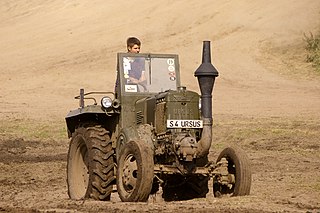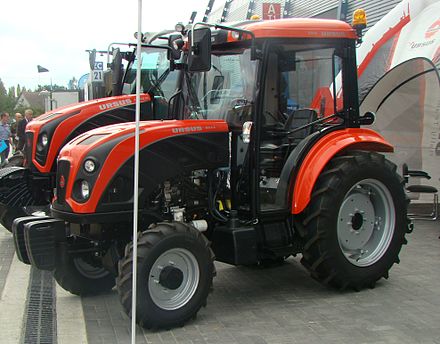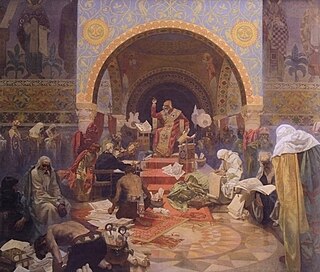
The Państwowe Zakłady Inżynierii was a Polish pre-World War II arms industry holding and the main Polish manufacturer of vehicles, both military and civilian.

Bogdan Corporation — is a leading Ukrainian automobile-manufacturing group, including several car- and bus-makers of the country. Its most popular model is the Bogdan Isuzu-powered light bus made in Cherkasy.

Bogdan Michał Borusewicz, was the Marshal in the Polish Senate from 20 October 2005 to 11 November 2015. Borusewicz was a democratic opposition activist under the Communist regime, a member of the Polish parliament (Sejm) for three terms and first Senate Marshal to serve two terms in this office. He was the acting president of Poland for a few hours in 2010.

Polski Fiat was a Polish car brand. Under this brand, cars under licence of the Italian manufacturer FIAT were manufactured or assembled in Poland.
Inter-Enterprise Strike Committee was an action strike committee formed in Gdańsk Shipyard, People's Republic of Poland on 16 August 1980. It was led by Lech Wałęsa and others and is famous for issuing the 21 demands of MKS on 17 August, that eventually led to the Gdańsk Agreement and creation of Solidarity.

Zbigniew Bujak was an electrician and foreman in 1980 at the Ursus tractor factory near Warsaw, Poland. He became engaged with trade union activists, and during the strike action, he organized strike committees at the Ursus factory. He became chairman of the Warsaw Solidarity branch in September 1980 and was one of the few Solidarity leaders who escaped arrest in 1981 after martial law in Poland was declared to break Solidarity. He became one of the leaders of the Solidarity's underground movement, organizing underground committees including underground press and radio. He was finally arrested in 1986, becoming the last Solidarity leader to be captured. Soon afterwards he was released in general amnesty, and participated in Polish Round Table Talks with the government in 1989. He was elected to the Sejm in the 1989 elections. In the 1990s he joined right-wing, liberal political parties, including the Citizens' Movement for Democratic Action, Democratic Union and Freedom Union. In 1992 he helped found the Labour Union (UP) party and was one of the party's leading members. He won a seat to the Sejm at the 1993 legislative elections, representing UP, and served as a member of parliament until 1997. He also held the position of chairman of Główny Urząd Ceł. In the 2000s (decade), after his 2002 defeat for the post of mayor of Warsaw, he stopped participating actively in politics.

The history of Solidarity, a Polish non-governmental trade union, began on August 14, 1980, at the Lenin Shipyards at its founding by Lech Wałęsa and others. In the early 1980s, it became the first independent labor union in a Soviet-bloc country. Solidarity gave rise to a broad, non-violent, anti-communist social movement that, at its height, claimed some 9.4 million members. It is considered to have contributed greatly to the fall of communism.

June 1976 is the name of a series of protests and demonstrations in People's Republic of Poland. The protests took place after Prime Minister Piotr Jaroszewicz revealed the plan for a sudden increase in the price of many basic commodities, particularly foodstuffs. Prices in Poland were at that time fixed, and controlled by the government, which was falling into increasing debt.

Fablok is a Polish manufacturer of locomotives, based in Chrzanów. Until 1947 the official name was First Factory of Locomotives in Poland Ltd., Fablok being a widely used syllabic abbreviation of Fabryka Lokomotyw, among others as the company's telegraphic address. It is now named "BUMAR - FABLOK S.A. (corporation)". Fablok is located in the town of Chrzanów in Lesser Poland. As of 2009, Fablok no longer builds new locomotives.
Uzel Holding was one of Turkey's oldest and largest manufacturing companies. Its main sector was agricultural machinery, although it eventually branched out into the automotive industry and real estate through its venture capital arm, Argentum. The company was founded in 1937. However, its roots went back to the middle of the nineteenth century. Uzel Holding collapsed in 2010 and was declared bankrupt in July 2012.

The Lanz Bulldog was a tractor manufactured by Heinrich Lanz AG in Mannheim, Baden-Württemberg, Germany. Production started in 1921 and various versions of the Bulldog were produced up to 1960, one of them being the Lanz Bulldog D 9506. John Deere purchased Lanz in 1956 and started using the name "John Deere-Lanz" for the Lanz product line. A few years after the Bulldog was discontinued the Lanz name fell into disuse. The Lanz Bulldog was one of the most popular German tractors, with over 220,000 of them produced in its long production life. The name "Bulldog" is widely used in Germany as a synonym for tractors even today, especially in Bavaria.
In the early spring of 1981, the quickly growing Solidarity movement faced one of the biggest challenges in its short history, when during the Bydgoszcz events, several members of Solidarity, including Jan Rulewski, Mariusz Łabentowicz and Roman Bartoszcze, were brutally beaten up by the security services, such as Milicja Obywatelska and ZOMO. The Bydgoszcz events soon became widely known across Poland, and on March 24, 1981, Solidarity decided to go on a nationwide strike in protest against the violence. The strike was planned for Tuesday, March 31, 1981. On March 25, Lech Wałęsa met Deputy Prime Minister Mieczysław Rakowski of the Polish United Workers' Party, but their talks were fruitless. Two days later, a four-hour national warning strike took place. It was the biggest strike in the history of the Soviet Bloc, it has also been called the largest strike in the history of Poland. According to several sources, between 12 million and 14 million Poles took part in it.
The Lublin 1980 strikes were the series of workers' strikes in the area of the eastern city of Lublin, demanding better salaries and lower prices of food products. They began on July 8, 1980, at the State Aviation Works in Świdnik, a town located on the outskirts of Lublin. By mid-July, 1980, some 50,000 local workers from more than 150 enterprises went on strike. These strikes marked the beginning of important socio-political changes in Poland, such as the creation of Solidarity and democratization of the country, heralding a wave of protests later referred to as the August 1980 strikes.
The 1988 Polish strikes were a massive wave of workers' strikes which broke out in 1988 in the Polish People's Republic. The strikes, as well as street demonstrations, continued throughout spring and summer, ending in early September 1988. These actions shook the Communist regime of the country to such an extent that it was forced to begin talking about recognising Solidarity. As a result, later that year, the regime decided to negotiate with the opposition, which opened way for the 1989 Round Table Agreement. The second, much bigger wave of strikes surprised both the government, and top leaders of Solidarity, who were not expecting actions of such intensity. These strikes were mostly organized by local activists, who had no idea that their leaders from Warsaw had already started secret negotiations with the Communists.

The 1982 demonstrations in Poland refers to anti-government street demonstrations organized by underground Solidarity to commemorate the second anniversary of the Gdańsk Agreement. The bloodiest protest occurred in southwestern Poland, in the town of Lubin, on August 31, 1982. The Lubin demonstration resulted in three protesters killed by Communist services, and an unknown number of wounded. On the same day, rallies and demonstrations took place in several cities across the country. According to Solidarity sources, there were four more victims—in Wrocław, Gdańsk, Nowa Huta, and Toruń. According to official government sources, there were demonstrations in 66 cities.

The Ursus C-45 and C-451 was a popular Polish model of tractor. It was manufactured from 1947 to 1959 by the Ursus Factory in Warsaw, and from 1960 to 1965 by Zakłady Mechaniczne in Gorzów Wielkopolski.

"Żeby Polska była Polską" is one of the best-known Polish protest songs written in 1976 by the Polish singer-songwriter Jan Pietrzak, with music by Włodzimierz Korcz. The song became an informal anthem of the Solidarity period in the People's Republic of Poland. From June 1976 protests against the Soviet-style communism imposed in Poland, all the way to the collapse of the Warsaw Pact in the 1990s, it was the symbol of the political opposition to the Communist regime. The song was widely popular among the members of Solidarity, and won first-prize at the 1981 National Festival of Polish Song in Opole. It won the main prize at the 1981 National Festival of Polish Song in Opole. It is one of Pietrzak's best-known works.

Ursus A was a series of Polish lorries and buses produced by Ursus. It was a license-built modification of the Italian SPA 25C Polonia trucks.

URSUS BUS is a Polish bus, coach, trolleybus manufacturer based in Lublin, Poland. The company was founded in 2015 by URSUS S.A. and AMZ-KUTNO S.A.































